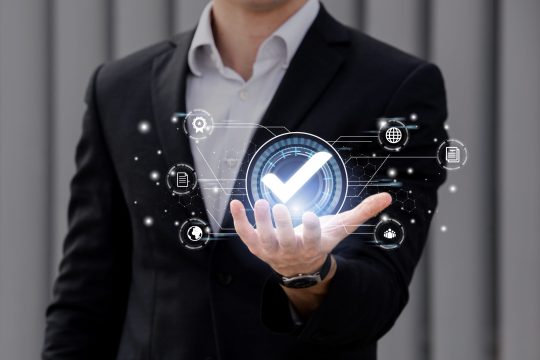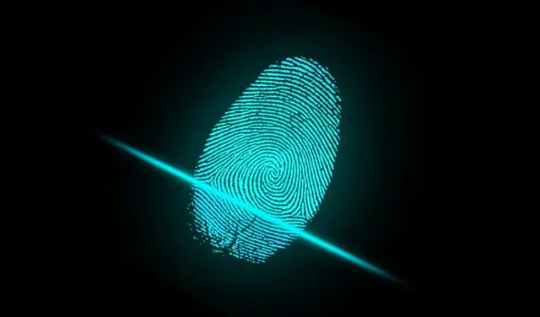#biometric verification
Explore tagged Tumblr posts
Text
आधार अपडेट: 7 साल बाद बच्चों का आधार कार्ड हो जाता है डिएक्टिवेट, जानें कैसे करें मुफ्त में अपडेट #News #Aadhaar #update #biometric #verification
0 notes
Text
आधार अपडेट: 7 साल बाद बच्चों का आधार कार्ड हो जाता है डिएक्टिवेट, जानें कैसे करें मुफ्त में अपडेट #News #Aadhaar #update #biometric #verification
0 notes
Text
Grindr Launches Critical Security Feature for UK Users

Grindr, a popular app for the LGBTQ+ community, has announced an important security update aimed at ensuring user safety and compliance. This new age assurance feature is specifically for UK-based users, addressing underage use of the platform. New Age Assurance Feature for Grindr Users As part of the UK Government’s Online Safety Act, new users downloading Grindr will now need to confirm they are 18 or older. This update reflects a commitment to creating a safe space for queer adults to connect and network. Previously, users were only required to enter their date of birth to create an account. With this new update, Grindr is implementing a more robust verification process to enhance user safety. How the Age Assurance Process Works Grindr users will undergo a simple verification flow that includes: Completing a quick video selfie. Pairing the video selfie with an official photo ID, such as a driver’s license, passport, or military ID. This verification process will only need to be completed once per account. Importantly, users will not be able to access the app until they complete this age assurance process, which applies to both new registrations and existing users in the UK. Privacy and Security Measures Grindr is partnering with FaceTec, a company specializing in biometric verification technology, to ensure that user privacy is a top priority. The data processing will be independently managed to protect user information while restricting access to adults only. As Grindr stated in their blog: “This age assurance process reinforces what Grindr has always been: a space for queer adults.” This commitment to maintaining a safe environment is vital for fostering meaningful connections within the LGBTQ+ community. Importance of the Online Safety Act The Online Safety Act mandates that platforms with sexually explicit content implement robust age-checking techniques by summer 2025. Given the nature of Grindr's offerings, the app certainly qualifies under this legislation. As Grindr emphasizes, the new age assurance process is a “fast, one-time check that helps keep Grindr safe, secure, and for adults only.” The company is dedicated to continuously monitoring global standards to evolve its tools, prioritizing user safety, privacy, and rights. Engage with the Community We invite you to share your thoughts on this important update in the comments below. Remember to keep the conversation respectful and constructive. At Enola.gr, we believe your story matters. Stay with us for more voices, news, and change from the global LGBTQ+ community.
#adult-only apps#age assurance#age verification#app security update#biometric verification#dating app security#digital identity#FaceTec#Grindr#Grindr UK#Grindr update#LGBTQ Rights#LGBTQ safety#LGBTQ tech news#Online Safety#Online Safety Act#queer community#queer dating#UK legislation#user privacy
0 notes
Text
SSC ने भर्ती परीक्षाओं में आधार-बायोमेट्रिक ऑथेंटिकेशन लागू किया, धोखाधड़ी पर लगेगी लगाम
Highlights: SSC ने UPSC की तर्ज पर उठाया बड़ा कदम आधार-आधारित बायोमेट्रिक ऑथेंटिकेशन होगा लागू परीक्षा केंद्र पर पहचान सत्यापन होगा आसान भर्ती परीक्षाओं में धोखाधड़ी पर लगेगा ब्रेक अगली परीक्षाओं से होगी नई व्यवस्था की शुरुआत Rewrite for BetulHub News Website: SSC ने भर्ती परीक्षाओं में लागू किया आधार-बायोमेट्रिक ऑथेंटिकेशन, UPSC की तर्ज पर उठाया बड़ा कदम BetulHub News: संघ लोक सेवा आयोग…
0 notes
Text
Did the PM Kisan Samman Nidhi money come into your account or not? Do not forget to do e-KYC, do e-KYC like this
Did the PM Kisan Samman Nidhi money come into your account or not? Do not forget to do e-KYC, do e-KYC like this पीएम किसान सम्मान निधि का पैसा आपके खाते में आया कि नहीं? e-KYC करना तो नहीं भूलें, ऐसे करें e-KYC New Delhi: Prime Minister Narendra Modi has transferred the 19th installment of the PM Kisan Samman Nidhi to millions of farmers’ accounts. On Monday, PM Modi transferred Rs. 22,000 crore…
#Aadhaar OTP#biometric verification#e-KYC process#e-KYC प्रक्रिया#face authentication#farmers#free benefits#PM Kisan#PM Kisan payment#PM Kisan Samman Nidhi#आधार OTP#किसान#किसान सम्मान निधि#पीएम किसान#फेस ऑथेंटिकेशन#बायोमेट्रिक e-KYC#सरकारी योजना
0 notes
Text
what’s trending on the internet as of February 15, 2025, based on the latest updates and reports
Here’s a summary of what’s trending on the internet as of February 15, 2025, based on the latest updates and reports: 1. Elon Musk’s 13th Child Sparks Global Interest Elon Musk is back in the headlines as Ashley St. Clair claims to have given birth to his 13th child five months ago. The news has sparked widespread curiosity and debate, with people speculating about the implications for Musk’s…
#5G#AI revolution#Amorepacific#AR/VR classrooms#artificial intelligence#Ashley St. Clair#BBC News#biometric verification#ChatGPT#CNET#CSO Online#cybersecurity#digital transformation#edge computing#EdSurge#EdTech#Elon Musk 13th child#Elon Musk news#future of connectivity#Gen Z tech trends#green tech#GreenBiz#immersive learning#influencer collaborations#interactive content#internet of things (IoT)#internet trends 2025#Lunchly#Mashable#Meta
0 notes
Text
NADRA to Integrate Facial Recognition Feature in Pak-ID App
Introduction The National Database and Registration Authority (NADRA) has taken a significant step towards modernizing Pakistan’s biometric and identity verification systems. Starting January 15, 2025, NADRA will launch a facial recognition verification service through its Pak-ID mobile app and registration centers nationwide. This initiative aims to enhance the efficiency and reliability of…
#biometric verification#digital solutions#facial recognition#identity verification#NADRA#Pak-ID app#Pakistan#Technology
0 notes
Text
Mandatory Age Verification For Social Media
I had a conversation with Copilot about Mandatory Age Verification For Social Media.
The proposed Social Media Ban for under-16s by the Australian federal ALP government involves Age Verification methods that include providing ID and biometrics, such as face scanning. This approach raises significant concerns about privacy and the potential for creating a de facto Digital ID system.
Practical Implications • ID Verification: Users would need to provide some form of identification to verify their age. This could include government-issued IDs, like passports or driver's licenses.
• Biometric Data: Face scanning or other biometric methods would be used to ensure the person presenting the ID is the same person using the social media account.
• Data Collection: This process would result in the collection of sensitive personal data, including biometric information, which could be stored and potentially used for other purposes.
Concerns • Privacy: The collection and storage of biometric data and personal IDs raise significant privacy concerns. There is a risk of data breaches and misuse of this information.
• Digital ID System: While the primary goal is age verification, the requirement for biometric data and IDs effectively creates a Digital ID system for social media users.
• Accessibility: Not everyone may have access to the required forms of ID or be comfortable with biometric verification, potentially excluding some users from social media platforms.
Conclusion In practical terms, the proposed age verification methods resemble the creation of a Digital ID system.
The Digital ID Program The Digital ID Program of the Australian government is designed to be voluntary, providing a secure and convenient way for individuals to verify their identity online. However it raises concerns about the proposed Social Media Ban potentially leading to a de facto compulsory Digital ID system.
Key Points • Voluntary Nature: The current Digital ID system is voluntary, allowing individuals to choose whether or not to use it.
• Age Verification: The proposed social media ban for under-16s involves age verification methods that include providing ID and biometrics, such as face scanning.
• Potential For Compulsory Use: While the Digital ID system is voluntary, the requirement for age verification on social media platforms could effectively make it compulsory for those who wish to use these services.
Conclusion The introduction of Mandatory Age Verification For Social Media could definitely be seen as a step towards a more widespread use of Digital ID, potentially leading to concerns about privacy and the implications of a de facto compulsory system.
The Social Media Ban Is The Vaccine Passport Program Revisited Voluntary programs can evolve into mandatory requirements over time. During the Covid-19 pandemic, Vaccine Passports initially presented as voluntary measures soon became essential for accessing certain services and venues. This shift highlighted concerns about how "voluntary" programs can, in practice, become quasi-mandatory.
Parallels Between Vaccine Passports and Digital ID For Social Media • Initial Voluntariness: Both vaccine passports and the current Digital ID system started as voluntary initiatives.
• Increased Necessity: Over time, certain activities (like entering premises during the pandemic) or services (like accessing social media) required compliance with these "voluntary" measures.
• Privacy Concerns: Both programs raise significant privacy concerns, particularly regarding the collection and use of personal and biometric data.
• Public Trust: The shift from voluntary to mandatory can erode public trust and lead to resistance or backlash.
Conclusion The potential trajectory of the Social Media Ban, requiring ID and biometrics for age verification, could mirror the path of Vaccine Passports, effectively making Digital ID a necessity for certain activities.
#copilot#copillot ai#politics#social media ban#social media#vaccine passports#digital identity#digital id#privacy#data breach#biometric verification
1 note
·
View note
Text
Aadhar-Ration Card linking deadline extended till September 30

The Central Government has extended the deadline for linking Aadhaar and ration cards until September 30. The original deadline was set to end on June 30, but it has now been extended by another three months. This measure aims to prevent the misuse of ration cards by linking them with Aadhaar to reduce fraud. Linking Aadhaar with ration cards ensures that food grains are provided to eligible beneficiaries and helps eliminate fake ration cards. To complete the linking process, individuals can visit the nearest ration shop or common service centre with their Aadhaar card, ration card, and necessary documents for biometric verification. The linking can also be done through the online portal.
URL :- https://www.newstap.in/telangana/aadhar-ration-card-linking-deadline-extended-till-september-30-1539843
1 note
·
View note
Text
Electronic Verification: A Solution To Have Successful KYC Compliance
Criminals develop more complex methods to commit various frauds such as money laundering, fake IDs, and identity theft, in the form of illegal transactions and payment breaches. Organizations require an efficient ‘Know Your Customer’ (KYC) process to identify their clients. KYC enables financial sectors and businesses to access the depth of client profiles onboarding process to identify their…

View On WordPress
0 notes
Text
Unveiling Tomorrow: The Evolution of Biometric Technology

Biometric technology refers to the automated recognition and authentication of individuals based on their physical or behavioral traits. Common examples include fingerprints, iris/retina scans, facial recognition, voice recognition, and even vein patterns. As technology continues advancing, biometrics are being integrated into more applications for convenient and secure identity verification.
The Growth and Evolution of Biometrics
The origins of biometrics date back over a century to the late 1800s when law enforcement began using fingerprints and facial photos for criminal identification. However, the past few decades have seen massive evolution and civilian adoption. Some key developments include:
1960s - First commercial biometric tech for fingerprint recognition
1970s - Voice recognition and iris scanning capabilities emerge
1980s/90s - Facial recognition and signature verification software introduced
2000s - Widespread integration into commercial devices and systems
2010s - AI and neural networks propel accuracy and versatility
Today biometric authentication is ubiquitous for everything from unlocking smartphones to passing border security. The global biometric market size is expected to grow from $45 billion in 2022 to over $125 billion by 2028.

Top Applications and Use Cases
Some top practical applications of biometrics include:
Government ID systems - e-passports, national IDs, voter registration
Law enforcement fingerprinting, face matching, and DNA analysis
Banking and financial services for fraud prevention and secure access
Smartphones, laptops, tablets that unlock via fingerprints or face scans
Airport security and border control including extensive biometric checks
Access control systems for facilities like data centers and laboratories
Healthcare organizations to control confidential records access

Cutting Edge Innovations
With constant improvements in sensor technologies and AI algorithms, the capabilities of biometrics are rapidly evolving. Some innovations gaining traction include:
Multi-modal systems combining multiple identifiers for better accuracy
Contactless biometrics like facial recognition or iris scans from a distance
Behavioral biometrics utilizing things like signature dynamics and gait
Expanded mobile applications leveraging built-in sensors
Emerging identifiers such as palm print, vein, and heartbeat recognition
Many expect biometric wearables integrated into clothing, accessories, and implants to eventually help facilitate frictionless interactions and commerce.
Challenges and Concerns
Despite the benefits, the expanded use of biometrics raises important challenges around ethics and privacy:
Mass surveillance and profiling risks from aggregated biometric data sets
Accurately balancing security with convenience and user experience
New spoofing and hacking vulnerabilities to protect against
Establishing strict controls and audit trails for internal users of data
Potential discrimination biases in underlying face/voice algorithms
Maintaining public trust and accentuating cybersecurity will be paramount as biometric prevalence grows. Carefully crafted policy and regulations can help guide responsible development.

The Future of Biometric ID
Many envision a future with biometrics seamlessly authenticating us for daily services ranging from mass transit to retail payments. Our physical identifiers could eliminate remembering passwords, showing ID cards, carrying keys, and more. This will ultimately depend on the technology proving highly reliable, and secure and addressing the ethical pitfalls around privacy erosion. If these conditions are met, biometrics could one day enable frictionless access control and transactions integrated into background processes.
#biometric technogy#biometrics#technology#biometric authentication#biometric identity#biometric verification#biometric identification#face recognition#tech blog#tumblr
1 note
·
View note
Text
#Kiosk Accessibility#Designing Accessible#Implement Accessibility#WCAG#Disabilities#Screen Readers#Section 508#Color Contrast#Accessibility Audit#web accessibility Audit#Designer Accessibility#Accessibility Testing#Accessibility Solutions#Accessibility Tools#Accessibility Technology#Facial Recognition#Biometric Verification#Inclusive Design#Universal Design#User Testing#Web accessibility#AEL Data
0 notes
Text
JEE Main 2025 सेशन 2 शुरू होने से पहले जान लें ये नियम: ड्रेस कोड से लेकर एग्जाम गाइडलाइंस तक सब कुछ!
JEE Main Session 2 Exam guidelines, dress code: देश की सबसे प्रतिष्ठित इंजीनियरिंग प्रवेश परीक्षा, जेईई मेन 2025 का दूसरा सेशन कल, 2 अप्रैल से शुरू हो रहा है। नेशनल टेस्टिंग एजेंसी (एनटीए) ने इस बार भी सख्त नियमों के साथ परीक्षा आयोजित करने की तैयारी की है ताकि पारदर्शिता और व्यवस्था बनी रहे। अगर आप भी इस परीक्षा में शामिल होने जा रहे हैं, तो एग्जाम सेंटर पर पहुंचने से पहले गाइडलाइंस और ड्रेस कोड…
#admit card rules#biometric verification#dress code#engineering entrance exam#exam guidelines#exam timing#JEE Main 2025 Session 2#National Testing Agency#prohibited items#self-declaration form
0 notes
Text
🗳️ Digital Voting 2025: How India is Reinventing Democracy Through Technology
India, the world’s largest democracy, is undergoing a silent revolution—one that’s transforming the very foundation of voting. In 2025, the spotlight is on digital voting 🖥️🗳️, a cutting-edge evolution aimed at increasing accessibility, transparency, and trust in the electoral process. As the nation embraces this high-tech shift, the future of Indian democracy looks smarter, faster, and more…
#AI in elections#biometric verification elections#blockchain voting system#digital voting India 2025#e-voting technology#Election Commission digital reforms#future of Indian democracy#India democracy innovation#Indian election technology#NRI voting India#politics 2025 India#remote voting in India#secure voting online#voting app India#voting system India 2025
0 notes
Text
New Billions App Ensures Safe ID Verification Without Biometrics!

With the ever-evolving landscape of digital identification and blockchain technology, a groundbreaking development has emerged from Billions Network, aiming to revolutionize how personal identity is managed and secured in the digital realm. Dubbed the AI Proof Identity App, this innovative platform seeks to empower users by ensuring their identities are protected against falsification and theft, aligning tightly with recent advancements in cryptocurrency and blockchain security. Revolutionizing Identity Verification The AI Proof Identity App by Billions Network is set to shift the paradigms of identity verification by incorporating cutting-edge artificial intelligence (AI) and blockchain technology. The app leverages AI to validate a user's identity documents swiftly and securely within a decentralized framework. This process not only enhances security but also increases the ease with which users can establish and confirm their identities without compromising on privacy. The use of blockchain technology further guarantees that each identity verification is recorded on a tamper-resistant ledger, offering an immutable history of identities that is not available in traditional identity management systems. Fostering Trust and Convenience One of the pivotal features of the AI Proof Identity App is its contribution to trust in digital transactions. In the realm of DeFi (Decentralized Finance) and NFTs (Non-Fungible Tokens), ensuring the authenticity of transaction parties is paramount. This application addresses this need by providing a reliable, verifiable digital identity. Furthermore, the convenience offered by digital identities can potentially streamline various processes in e-commerce, online finance, and even voting, presenting a significant relief from the traditional cumbersome practices that plague secure online interactions. Global Impact and Regulatory Considerations As digital identities become almost a necessity in a world moving towards more digital interactions, regulatory frameworks are adapting. Various global jurisdictions are considering how best to incorporate these new technologies within their legal parameters to protect consumers while fostering innovation. The introduction of the AI Proof Identity App falls into a critical time of legislative development and could potentially influence how laws are shaped around digital identification and security in the blockchain sector. In conclusion, Billions Network's AI Proof Identity App positions itself as not just a technological innovation, but as a catalyst for broader regulatory and societal adaptations to how identity is perceived and maintained in the digital age. With its promise of enhanced security, convenience, and trust, the app sets the stage for a new era of digital interactions safeguarded by blockchain and AI technologies.
#app#Billions#Biometrics#Bitcoin News#Breaking News#Crypto Breaking#Crypto Breaking News#crypto news#Ensures#safe#Verification
0 notes
Text
0 notes